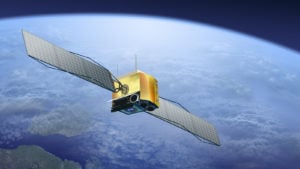But don’t lump all space industry stocks in with SPCE and its peers. We’re seeing a record resurgence in public space sentiment as planned manned and unmanned flights take shape. Analysts project the industry will be worth $1 trillion within the next few decades.
Of course, Elon Musk and SpaceX deserve much of the credit for renewing national interest in space. But, from an operational perspective, Musk should look out for these three space industry stocks making waves today.
AST SpaceMobile (ASTS)

Major January news for AST SpaceMobile (NASDAQ:ASTS) positions it at the top of the list based on imminent strength and current cheap share price.
When commercially available, the space company will deliver 5G cell service globally. Using low-earth satellites, it will cover cell tower “dead zones” in rural and remote areas. It is far from competing with Musk and SpaceX’s Starlink project. But ASTS’s cell satellites work through different frequency channels and operationally target an equally different market.
In January, the company completed the final part of the puzzle to move forward with planned commercial launches this year. Specifically, the pre-revenue space stock secured $206 million in strategic funding from major backers, including AT&T (NYSE:T) and Google (NASDAQ:GOOG, NASDAQ:GOOGL). The cash infusion, in addition to a planned draw against an existing $51 million credit account, positions the company well. It can expand its massive BlueWalker 3 satellite communications array, delivering cellular broadband speeds as fast as 120 megabits per second.
The downside, in addition to strategic funding, is the company issuing further equity to the tune of $100 million. The stock sale, of course, has a dilutive effect on shareholders, and shares plummeted more than 40%. But the overall dilutive effect of 5% and 10% shows the stock drop is an market overreaction, considering ASTS’ impact over the next few months.
Amazon (AMZN)

Of course, Elon Musk’s biggest worry when it comes to space industry stocks is direct competitor Amazon (NASDAQ:AMZN) in the form of its Kuiper Systems subsidiary. The spin-off project takes on Starlink directly. It seeks to “connect more than 3,000 satellites in a mesh network that blankets Earth” and deliver comparable Internet access to Starlink’s existing constellation. A late December 2023 test validated the satellites’ ability to beam data between themselves and maintain a stable connection reaching 100 gigabits per second. Amazon plans to begin deploying commercial services sometime this year at speeds up to 400 megabits per second. That is double the average Earth-based broadband speed in the US.
Of course, Kuiper currently relies on SpaceX for outer-earth satellite delivery, somewhat hamstringing its potential as a direct Musk competitor. But, in the background, Amazon-associated Jeff Bezos’s “side project,” Blue Origin, is still ramping up efforts to threaten SpaceX directly. If Bezos, between Amazon and peripheral projects, can close a complete space-based value chain as effectively as he did Amazon’s retail one, Musk has major worries ahead.
RocketLab USA (RKLB)

RocketLab USA (NASDAQ:RKLB) ended 2023 with a bang and kicked things up a notch in January. Following another successful launch (the company’s 43rd overall and first this year), it stands among the top space industry stocks to watch this year.
The company’s stock soared by 25% right before the new year after announcing a $515 million government contract. This agreement entails the production of 18 space vehicles and their long-term maintenance post-launch, extending potentially until 2033.
In a record-setting year, RocketLab achieved two significant milestones in 2023. Those are its 42nd Electron rocket launch and its 10th launch within a single year, setting a new record for the company. These achievements, coupled with the government contract, mark a robust conclusion to 2023, particularly after a flight failure caused its shares to plummet earlier that year.
RocketLab’s valuation is a tad high today after the government contract nearly doubled its annual revenue. RKLB’s current market cap is $2.36 billion, and it trades at nearly 10x sales. Markets are essentially front-running rapid growth this year. This expectation might lead to shares trading sideways until further developments unfold. Still, the government contract is a significant win for Rocket Lab, promising considerable long-term growth potential for the company.
On the date of publication, Jeremy Flint held no positions in the securities mentioned. The opinions expressed in this article are those of the writer, subject to the InvestorPlace.com Publishing Guidelines.
Jeremy Flint, an MBA graduate and skilled finance writer, excels in content strategy for wealth managers and investment funds. Passionate about simplifying complex market concepts, he focuses on fixed-income investing, alternative investments, economic analysis, and the oil, gas, and utilities sectors. Jeremy’s work can also be found at www.jeremyflint.work.
